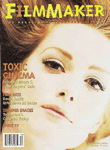 Back to selection
Back to selection
FILMMAKER FLASHBACK: SUMMER, 1995
 Summer, 1995. Safe. The Usual Suspects. Kids. Living in Oblivion. Double Happiness. The Brothers McMullen. The Incredibly True Adventure of Two Girls in Love. Art for Teachers of Children. All in the same issue. What a quarter for independent film releases!
Summer, 1995. Safe. The Usual Suspects. Kids. Living in Oblivion. Double Happiness. The Brothers McMullen. The Incredibly True Adventure of Two Girls in Love. Art for Teachers of Children. All in the same issue. What a quarter for independent film releases!
Julianne Moore from Safe was on the cover, inaugurating our irregular tradition of the big-head cover photo. Larry Gross interviewed Haynes, and it’s a great interview. An excerpt:
Gross: Leaving the world of the film for just a second, do you ever feel ambivalent about making a film that’s this pessimistic? Is somebody watching the film gonna say “I should give up, there’s no hope” or do the opposite and develop a new political awareness at the end?
Haynes: If the film is constructed with any kind of target, it targets that unbelievably persistent “warm feeling” in Hollywood filmmaking that every clumsy narrative is moving towards achieving in the last five minutes, where the central character is really the director, is really the writer, is really you and we’re all the guys and we’re all in it together and we get the girl and feel so good about life. It’s so upsetting to me, I can’t tell you. It’s such a fucking lie and that’s what I wanted to dispel in most of the films I’ve made. So, to feel really sad for one fragile woman for two hours… If anything, what Safe does is refute the sense we make of identity, the sense we make of cures, the sense we make of notions of wellness and health. I think its most hopeful place is in the middle of the film. [Carol] gets angry in the hospital and says, “It’s the chemicals that did it to me.” There’s something about saying “It’s the chemicals,” which up to that point, until you know that it may be the chemicals, all you can think of is, “It’s her. She’s a mess. It’s in her head. She’s a nut. She’s a fruitcake.”
I interviewed Maria Maggenti, who discussed the influence of Go Fish on Incredibly True Adventure of Two Girls in Love:
Filmmaker: You started this right around the time that Rose Troche’s Go Fish was in the theaters. How did the film and it success affect you on this project, both creatively and in terms of people’s receptivity to the film?
Maggenti: That had a huge impact on me. When I first saw Go Fish, which was at a press screening before it was released, I was thrilled to death. This was before I had written Incredibly True Adventure. I was struggling with a more melodramatic, tragic script and I walked out of that screening thrilled. I was thrilled for two reasons. One, because it seemed like a film that had an original voice. Not that Claire of the Moon bullshit that just throws those lesbian characters up on the screen and hopes for the best, but really a voice. And the second reason was purely personal. I could relate to all the characters. I felt like, “Oh my god, I wore those exact cut-off jeans and t-shirt with belt and high tops three summers ago,” so I identified with it. Subsequently when the script was finished and I began to do the little knock knock on the producers’ doors, I don’t think distributors would’ve expressed so much of an interest in this project had it not been for Go Fish.
Also in the issue, Kevin Smith interviewed The Brothers McMullen‘s Ed Burns in a funny and wide-ranging conversation that captures some of the fizziness of that year’s indie film boom. I can’t imagine this exchange in the magazine today.
Smith: You know, I’m gonna jump way ahead, let’s talk about box office. Make a box office call, roughly.
Burns: You know, I was hoping, because of Reservoir Dogs, your film – there’s this new generation of independent filmmakers. We’re not like the artsy, esoteric independent filmmakers. I think our stuff is more accessible and we’re writing for the guys that we know who would never have gone into the Angelika theater.
Smith: One might argue that more than anyone, we make these films for ourselves. These are things we would like to see on screen. I think [Brothers McMullen] has the potential to go above and beyond [the Clerks] audience, because our audience, or the movie itself, skews to a very specific population. Because it’s got language and because it’s dealing with topics that put a lot of people on edge, it wasn’t going to go beyond that 3-point-something figure. McMullen is a family piece. But it’s not sappy-sweet, like The Passage or something. So in the month of August when this movie comes out –
Burns: Terrifying.
Smith: It’s so fucking bad. Desperado’s going to be out. Now that violence and the Quentin backlash is starting to begin and Desperado comes on the heels of that, people are gonna – I don’t know what it’s gonna do. Now all you need is one politician to turn around and be like, “Look, here’s a healthy alternative to all of that kind of cinema. Here’s a movie, it’s about family.” And the audience will go “Ugh. It’s about family.” But it’s not that “family” family, you know? It’s the approachable family film. So if you could catch a wave like that? You definitely could ride it out for 10 million in the independent film industry.
According to iMDB, The Brothers McMullen grossed $10,246,000 in the U.S.
